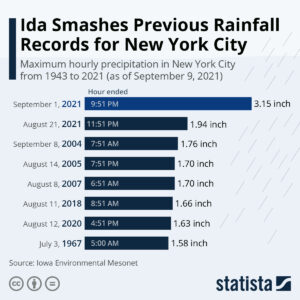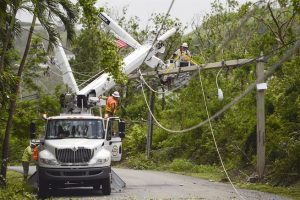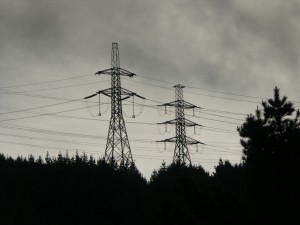4 item(s) were returned.
President
The Stella Group, LTD
The year 2021 has already outpaced 2020 in terms of extreme weather events. On the anniversary of Hurricane Katrina, Hurricane Ida left more than 1 million residents without power for days and led to historic rain in New York City. In February, Texas was hit with a historic -2 degree (F) cold snap that left 4.4 million people without power, caused enormous strain on the power grid, and froze pipelines. At least 217 people were killed directly or indirectly by severe cold, and the damages are estimated to be about $21 billion. This year, California faces the triple threat of wildfire… [more]
View InsightPresident
The Stella Group, LTD
According to the Fourth National Climate Assessment, humans are the dominant cause of global temperature rise, which many believe is directly responsible for the increased intensity of extreme weather events. The assessment shows that extreme events have cost the U.S.more than $1.1 trillion since 1980, and also warns that “The frequency and intensity of extreme high temperature events are virtually certain to increase in the future as global temperature increases”. We have only to look to Texas, Florida, and Puerto Rico where major hurricanes caused catastrophic damage to the electric grid creating heightened concern for resiliency. The inability to re-establish… [more]
View InsightChair, Energy & Commerce Subcommittee on Environment & Climate Change, U.S. House of Representatives
Co-Chair, Sustainable Energy & Environment Coalition
On a hot day in August 2003, a stretched transmission line tripped after dipping into an overgrown tree in Ohio. Soon after, multiple transmission lines nearby also tripped beginning what would become the second-largest blackout at that time in history, impacting eight Northeastern states and Southern Canada. Since this massive blackout and concerns about grid reliability, power generation in the United States has changed dramatically both in form and quantity. In 2005, Congress recognized the need for mandatory grid reliability standards and expanded the Federal Energy Regulatory Commission’s (FERC) authority to regulate the bulk power system. However, despite FERC’s efforts… [more]
View InsightProfessor of Physics
City College of the City University of New York
Despite aggressive requests from the Obama Administration and the Department of Energy’s Office of Science, the House in the most recent appropriations debate made significant efforts to reduce funding for climate-related science. The Senate prevailed in the subsequent negotiations, and nearly all Office of Science programs received modest funding increases. Although it lost its appropriations battle, the House’s efforts to trim the Office of Science’s funding demonstrate its strong skepticism about climate science. Further reflecting its attitudes, the House defunded enforcement of standards for more efficient light bulbs, publicly challenged the validity of climate science, relentlessly pushed the Keystone XL … [more]
View Insight


